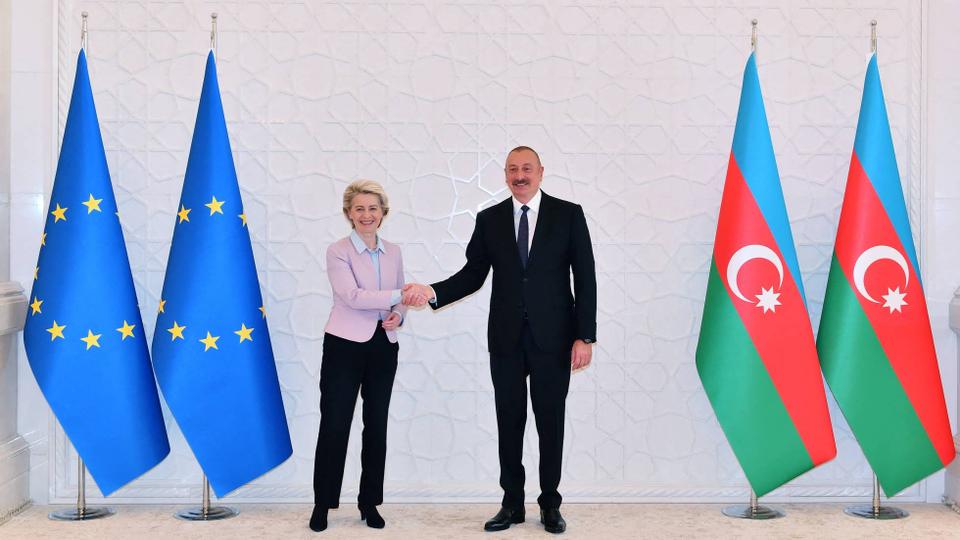Azerbaijan currently delivers around 8 billion cubic metres of gas per year to the EU, and is expected to expand its capacity to 20 billion cubic metres by 2027.

The European Commission has signed a memorandum of understanding with Azerbaijan to double imports of Azeri natural gas to at least 20 billion cubic metres a year by 2027.
European Commission President Ursula von der Leyen and Azerbaijan’s President Ilham Aliyev signed a memorandum of understanding (MoU) on a strategic partnership in the field of energy, the EU executive body announced in a statement on Monday.
“Azerbaijan is a crucial energy partner for us that has always been reliable,” von der Leyen said at a joint news conference with Aliyev following the signing ceremony in Baku, Azerbaijan’s capital.
Through the Trans Adriatic Pipeline, Azerbaijan is “delivering currently more than 8 billion cubic metres of gas per year and we will expand its capacity to 20 billion cubic metres” until 2027, she elaborated.
The Azeri gas imports will already increase to 12 billion next year, which “will help compensate for cuts in supplies of Russian gas and contribute significantly to Europe’s security of supply,” she added.
The new deal also aims to contribute to climate neutrality and cooperation on renewable energy.
For his part, Aliyev stressed that “issues of energy security today are more important than ever before.”
He added: “Long-lasting, predictable and very reliable cooperation between EU and Azerbaijan in the field of energy is a big asset.”
Azerbaijan has a tremendous potential in renewable energy.
— Ursula von der Leyen (@vonderleyen) July 18, 2022
Today we are laying the ground for a new partnership in this area.
And we commit to reducing methane emissions through the entire gas supply chain. https://t.co/DQtFG7GFbu
Reducing dependency on Russian energy
The Southern Gas Corridor transporting Azeri gas to the EU has been operational since 2020.
The gas from Azerbaijan arrives in Europe via Türkiye through the Trans Anatolian Pipeline, which is connected to the bloc’s Trans Adriatic Pipeline, supplying gas from Greece to Italy.
In response to the Russian offensive in Ukraine, the European Commission revealed plans in March to reduce dependency on Russian energy by cutting two-thirds of gas imports.
For this purpose, the bloc aims to accelerate the green transition into renewables and secure fossil fuel supply from new partners.
In parallel, the EU has also slapped six sets of sanctions against Russia, including a ban on crude oil and coal imports.
Source: TRTWorld and agencies
Social media is bold.
Social media is young.
Social media raises questions.
Social media is not satisfied with an answer.
Social media looks at the big picture.
Social media is interested in every detail.
social media is curious.
Social media is free.
Social media is irreplaceable.
But never irrelevant.
Social media is you.
(With input from news agency language)
If you like this story, share it with a friend!
We are a non-profit organization. Help us financially to keep our journalism free from government and corporate pressure












0 Comments